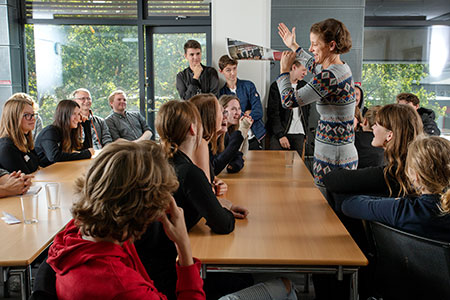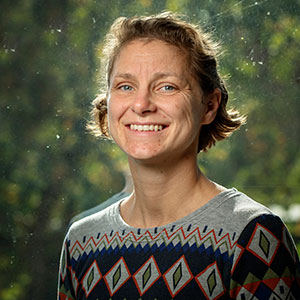Anne Hauch’s daily work at DTU Energy involves ‘feeding’ electrolytic cells with CO2 and electric energy from wind turbines, for example, to produce green petrol, among other things. Seen in this light, CO2 is a valuable carbon source which can be reused to ensure that even the transport sector can transition towards renewable energy.
The fact that Anne Hauch became a researcher was something of a coincidence. She completed her teacher training programme and went on to teach at Aalborg City Gymnasium where she made a bet with a physics teacher about whether research was still being conducted into fuel cells in Denmark.
Anne thought there was. She googled the words ‘fuel cell research’ and discovered that Risø National Laboratory were looking for a PhD student. The job went to Karl, who became her colleague and ‘office mate’ when Anne shortly thereafter landed another PhD position in the same group at Risø.
“I think a lot about expressing myself in such a way as to achieve ‘maximum impact’. It may well be that my world revolves around fascinating details like finding impurities in ppm concentrations and characterizing micro and nanostructures, but if my work is to be of relevance to others, they have to be able to see the value for society—it can’t just be something that excites me.
Her time as an upper secondary school teacher taught Anne Hauch to communicate effectively to large groups of people. She uses this experience as a researcher when giving lectures on fuel cells and electrolysis cells at the People’s University in Denmark and the Danish Natural Science Festival.

“I feel a duty to take part in the public debate. As researchers, it is important that we can explain our field of research to a ‘lay audience’. They pay our salary and will also take part in the debate on CO2 emissions and how we can reuse CO2. It’s not just something that goes on in the lab. It also has relevance to Danes’ everyday lives,” she says.
Reflects on work The more popular science lectures cause Anne to reflect on her work. Often there will be questions from the audience that she has not even thought of—e.g. how can we and must we reuse electrolytic cells, or what water and power consumption look like when researchers produce electrolytic cells.
“When as a researcher you become immersed in the smallest details, you can sometimes ask yourself the question: do we actually make a difference? Are we moving forward? Are we developing the technology? I think what we do makes a difference—and that our work will make an even bigger difference in the future. Today we can run tests on electrolytic cells that are three times more efficient and last 100 times longer than they did ten years ago—so yes, research is far from stagnant.”
Anne is not particularly ‘holy’ when it comes to the climate. She cycles to work, but uses a tumble dryer at home. She flies when she needs to travel and does not have solar cells on the roof because she finds the red roof tiles so pretty.
She believes that inventions and innovation can save the world from climate crises and energy challenges, but she is also concerned that we may not be giving sufficient priority to the climate and renewable energy—whether people are willing to pay that extra ten per cent.
Renewable energy for all
"We’re not the only ones with a CO2 problem—it’s a global problem, which is why it doesn’t help that Denmark alone is a ‘frontrunner’ in solar and wind energy. The rest of the world will also have to learn how to convert and store renewable energy."
Associate Professor Anne Hauch, DTU Energy
“If we can find the right technological solutions, we do not necessarily need to stop because they costs twice as much. The German company Sunfire recycles CO2 in an electrolysis system and uses power from wind turbines to produce green petrol. With their technology green petrol costs about twice as much as conventional petrol from fossil sources, but that shouldn’t be an obstacle. When I was born, solar cells cost 200 times more than they do today and look at how solar cells have spread even though originally the price of technology was ridiculously high.”
She is convinced that there is enough renewable energy to go around. Each year, the sun alone sends an amount of energy corresponding to 5,000-6,000 times the Earth’s total energy consumption. But it is about finding new, smart ways of converting energy rather than simply reducing energy consumption. If we become really skilled at collecting CO2 from the atmosphere and reusing it, then CO2 will no longer be a disaster but rather a carbon resource.
“We’re not the only ones with a CO2 problem—it’s a global problem, which is why it doesn’t help that Denmark alone is a ‘frontrunner’ in solar and wind energy. The rest of the world will also have to learn how to convert and store renewable energy,” says Anne Hauch.
“I experienced first hand how some Chinese researchers thought that I’d added a zero too many in my presentation when I mentioned the share of renewable energy in Denmark. The way forward is also to show cases like the self-sufficient Danish islands of Samsø and Bornholm so that people see that it can actually work. They can be scaled up and inspire others."
She believes that we have already come a long way in developing technological solutions to collect, store, and reuse CO2 for synthetic fuels and for converting and storing renewable energy—but we are still not there yet.
“I like to say that when I retire, I’ll run the car I no longer have on green petrol. It won’t be in five years. But my children will, of course, experience running their cars on green fuel.”

Anne Hauch is 41 years old. She lives in Roskilde with her husband Klaus and their ten-year-old son Jacob and nine-year-old daughter Caroline.
2015-: Lecturer at The People’s University
2013: External research stay at AIST in Tsukuba, Japan
2012-: Chairman of the Board of Studies at DTU energy
2012: Appointment as associate professor at DTU Energy
2011: Appointment as senior researcher at Risø DTU
2009: Appointment as researcher at Risø DTU
2007: Appointment as postdoc at Risø DTU
2004–2007: PhD student at Risø National Laboratory, DTU Chemistry
2005: External research stay at EMPA, Dübendorf, Switzerland
2003-2004: Upper secondary school teacher—Aalborg Student Course
2001–2003: MSc, Department of Chemistry—Aarhus University